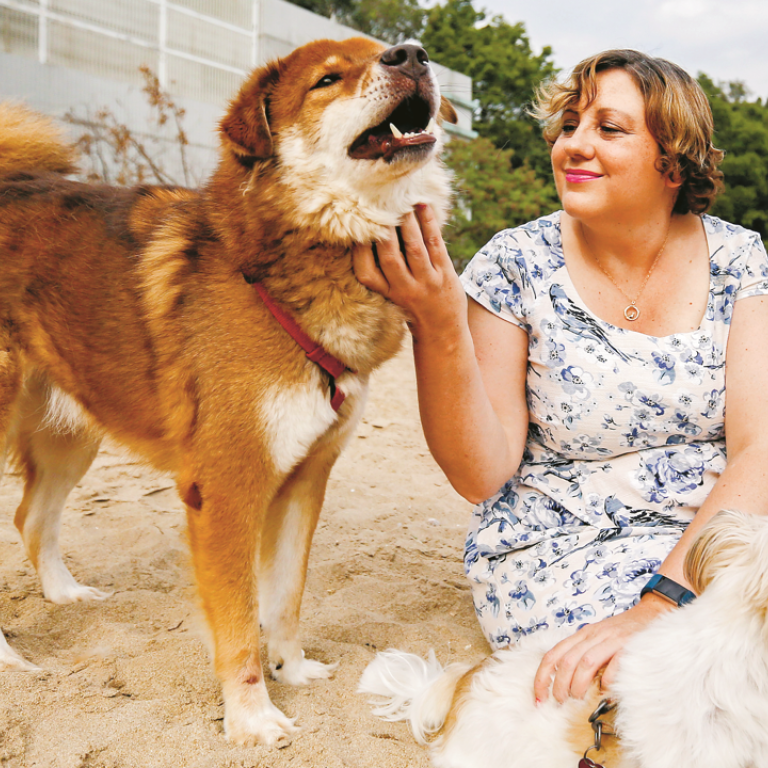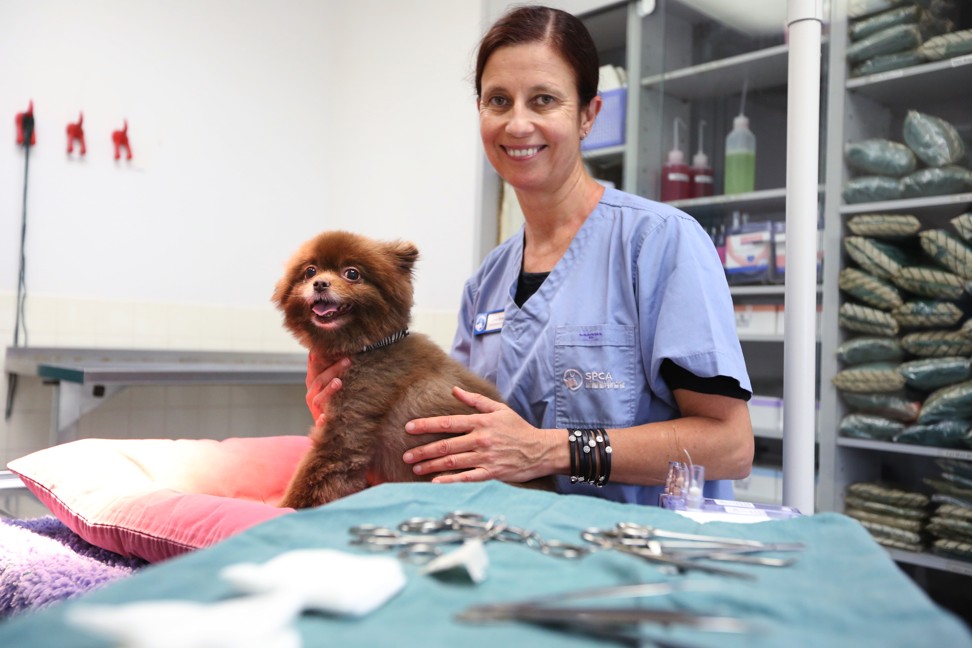
Breast cancer survivor says dogs were a lifesaver, and she’s not alone – studies show many ways keeping pets is good for health
Hong Kong teacher Tracy Riccio credits her rescue dogs with saving her during months of treatment, and widening her social circle; experts explain the benefits of dog ownership, especially for the young, and old people living alone
Owning a dog is linked to a longer, healthier and happier life, according to a new study of almost 3.5 million people conducted over a 12-year period.
The research, published in online journal Scientific Reports last month, is the latest in a growing body of evidence suggesting that furry or feathered companions may be good for human health – especially dogs, and especially for people who live alone.
Vegan dogs and cats in Hong Kong – how diet lowers pets’ carbon footprint and improves their health, according to owners
Tracy Riccio, who teaches at a primary school in Mong Kok, knows all about that. She credits the two dogs she adopted from a rescue shelter with helping to save her life after she was diagnosed with breast cancer in April 2016.
“One of the things that got me through my 10 months of treatment was my dogs,” she says. “They gave me a reason to get up and do something and when I was feeling my worst, there was nothing better than laying on the sofa or bed with them at my side.
“They gave me a reason to get well and get up every day, because no matter how sick I felt, the dogs needed to be fed and walked.”

Karina O’Carroll is the animal welfare education manager at Hong Kong’s Animals Asia Foundation, which works to end the trade in bear bile, and in cats and dogs for food in China and Vietnam. She has 12 pets – two dogs, two cats, seven turtles and a chinchilla, all rescued – and confirms the study’s findings that the companionship and unconditional, non-judgmental bond that comes with caring for pets, particularly dogs, is hugely rewarding.
“There are myriad known benefits of pet ownership with regards to reducing loneliness and depression and encouraging social and emotional bonds,” she says.
Elderly people often live alone, she says, with no one to look after or to look after them. Having a pet provides company and the reassuring routine that comes with feeding, walking and caring for another creature. Pets help to fill widening gaps as we lose the humans in our lives.
The woman whose heart almost literally broke when her dog died – and what emergency room doctors learned from her case
Jane Gray, deputy director and chief veterinary surgeon at Hong Kong’s Society for the Prevention of Cruelty to Animals (SPCA), explains that our relationship with animals is changing.
“Traditionally, companion animals – dogs and cats – were considered as property or possessions kept on the fringes of the family system,” she says. “But as our relationship with them has developed, they are now considered an integral part of the family unit, sometimes even replacing children. This can be seen with Hong Kong’s falling birth rate against an increasing pet ownership [rate]– cat and dog ownership shot up by 40 per cent between 2005 and 2010.”
More than 10 per cent of Hong Kong households now have at least one pet.
Gray says the human-animal bond is key to the relationship. The American Veterinary Medical Association describes it as “a mutually beneficial and dynamic relationship between people and other animals”. This bond can have unexpected positive effects on health and well-being, and can even give us a reason to live.

Riccio moved to Hong Kong from London seven years ago and found it hard not having pets as she had grown up around them. That changed four years ago when she moved to a dog-friendly estate and adopted Gaston, a six-year-old shih-tzu, from Hong Kong Dog Rescue. A year later, mixed-breed Marley joined the family when he was just a pup.
“From the day I got him Marley followed me everywhere,” Riccio says. “Now I have the dogs, my flat feels like a home.”
Owning a pet, Gray says, can benefit people of any age, but especially the young and the old. “Animals can help develop basic trust, compassion, empathy and a sense of responsibility in people, for example by looking after the family dog as a child,” she says. One study has shown that young adults who had pets in childhood were more empathetic, more aligned with social values, and more likely to choose careers in caring professions.
All of the best friends I have, I met because of the dogs … they sniffed out the people I now consider to be my family
Animal ownership has positive physical effects as well. The act of stroking a cat, for example, is known to be calming, helping to reduce blood pressure. Similarly, studies by the US Centres for Disease Control and Prevention and the National Institutes of Health show a clear link between pet ownership and decreased blood pressure, cholesterol and triglyceride levels – all of which reduce a person’s risk of heart attack.
For those who have had a heart attack, research indicates that patients with a dog or a cat tend to have better recovery rates. These benefits are thought to be connected with pets’ tendency to help reduce, or at least control, their owners’ overall stress levels – particularly dogs, which encourage their owners to be more physically active by taking them out on walks. Simply looking at a beloved pet can also prompt a surge of oxytocin, one of the brain’s “feel good” hormones.
It’s a dog’s life in Hong Kong for canine companions and their carers
Study findings also suggest pet owners have increased social well-being – dogs lend an excuse to talk to other dog owners, for example, to which Riccio can attest.
“All of the best friends I have, I met because of the dogs … My dogs made friends with their dogs and soon the humans became friends, too. I often say that not only did my dogs choose me, they also sniffed out the people I now consider to be my family and they picked really good people.”
When Riccio was feeling low during her months of cancer treatment, the neighbours would bring their dogs over. “We would fill the house with dogs and have a sleepover and instantly I’d feel much better,” she says.
Incredibly, dogs also boost our immunity. Our overly disinfected lifestyles may – ironically – be making us more vulnerable to illness, but dogs bring dirt into our homes and lick us, which could affect the bacteria that live in our gut and thus our health. People with dogs especially seem to get ill less frequently and less severely than people – especially children – with cats or no pets.
Should Hongkongers with their tiny flats own cats? Seven tips for keeping your indoor pet happy, according to experts
While dog hair can be one of the worst triggers for people with allergies, growing up in a house with a dog makes children less likely to develop allergies over the course of their lives. James Gern, a paediatrician at the University of Wisconsin-Madison, has conducted a number of studies that demonstrate having a pet in the home can lower a child’s likelihood of developing related allergies by as much as 33 per cent.
Dogs and cats provide incredible benefit for people at both ends of life - physiologically for children - pets do not just promote an immune boosting benefit, as well as emotionally - they are known to be excellent therapy companions for children with autism, for example, and at the end of life. Touch is one of the last senses to be affected by the symptoms of Alzheimer’s disease, so stroking a pet can bring enormous pleasure.
Pets are now considered an integral part of the family unit, sometimes even replacing children
Gray warns, however, that animals come with responsibility and a dog or cat really isn’t just for Christmas.
“While pet keeping is generally great for both sides, sometimes it can go wrong. For instance, an owner who truly does replace a child with a pet and dresses them up, takes them to pet spas, paints their nails and pushes them around in a pram … this might bring the owner pleasure … but not the pet … they would much rather spend time playing with their owner.
“The human-animal bond is about a balance. The key is being a responsible pet owner, providing for all their welfare needs – physical and emotional – and in return your pet, be it a cat or dog or rabbit, will give you back the unconditional love you deserve.”

